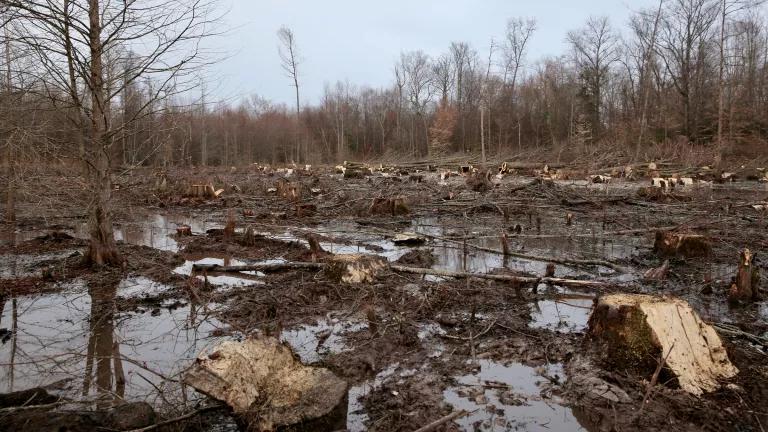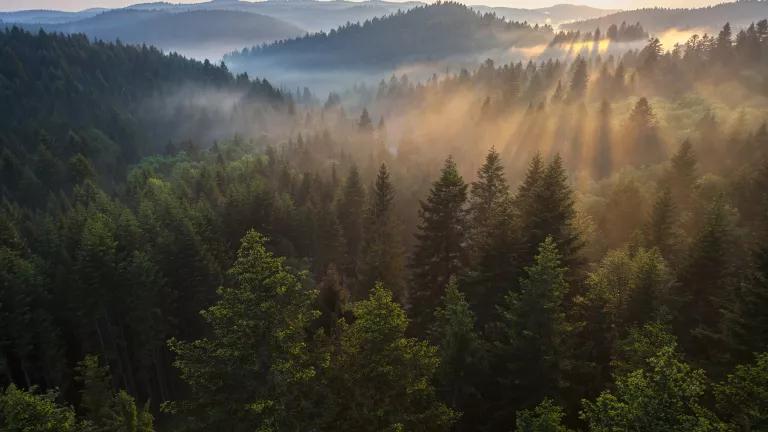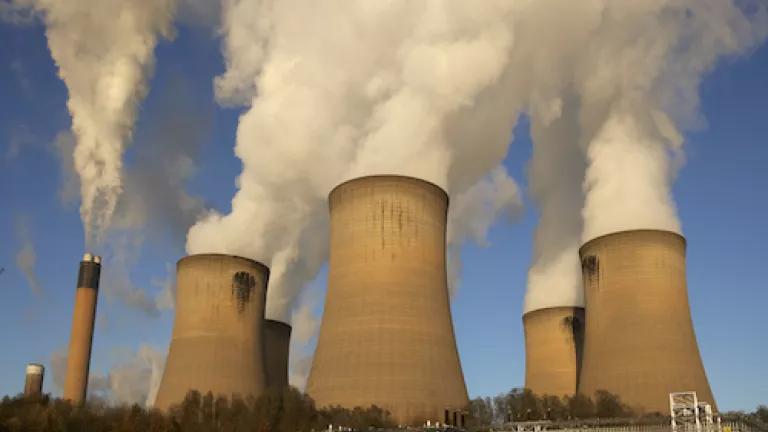
(C) River Jordan for NRDC
When a government like the UK makes a big decision – like on an energy project – it’s supposed to consult with the public. But for its recently-announced consultation on giving billions of dollars to the biomass industry to install bioenergy with carbon capture and storage (BECCS), it seems to have already made up its mind. This has been reinforced by quotes by Rishi Sunak MP, as well as an ‘anonymous Whitehall Source’ in a recent Yorkshire Post article.
Indeed, the consultation – which the UK’s Department for Business, Energy & Industrial Strategy (BEIS) launched in August – reads like a wish list to the bioenergy industry and, while it doesn’t name any bioenergy company in particular, Drax (the UK’s largest biomass power plant), is the only company that fits BEIS’s location and timescale criteria for this money. Unsurprisingly, Drax has welcomed the government’s proposed plan.
This is not a huge shock, unfortunately. We know the UK Government has met many more times with the biomass industry than with environmental groups. This shows that the industry has benefitted from those meetings with a new subsidy system that would be perfect for them–a clear example of corporate capture of government.
Of course, the UK has already handed Drax lots of money—about a billion a year and counting.
Here’s why the UK should reconsider its ill-conceived plan to fund the installation of BECCS at Drax's Yorkshire power plant:
-
It will increase costs to billpayers –The consultation proposes that for a period of 10-15 years, UK billpayers will bear ALL the costs of Drax’s installation of carbon capture equipment on its smokestacks (estimated at £31 billion) and all costs associated with burning wood pellets that exceed the price of other forms of electricity generation. In doing so, BEIS’s preferred option would put the burden of risks associated with biomass on billpayers’ shoulders, including shifts in feedstock price. Thus, if pellet prices rise, Drax will directly profit via its large pellet business while also getting money from billpayers.
The Government is planning to pay for all this through a new green tax on energy bills. This will significantly raise energy bills at a time when UK citizens are already suffering from inflation and energy shortages and would benefit much more from investment in cheaper true renewables like wind and solar. Billpayers have already gifted Drax nearly £1billion per year via a surcharge on their electricity bills. Drax’s subsidies are currently due to end in 2027, but this consultation will mean over a decade of more handouts to an industry that is harming both people and the planet.
-
It will undermine energy security – To capture carbon, Drax will need to divert around one third of the electricity its units generate, which is enough electricity for 41,000 homes. As such, BECCS would reduce the amount of power Drax can produce by at least 28%. Far from supporting “energy security,” as the UK claims in the consultation document, this would actually increase the risk of blackouts for thousands of families in Briton.
-
It won’t work – All available evidence suggests that no one (including Drax) possesses the technical know-how to deploy BECCS. Even the Government states that its Technology Readiness Level is a 7 and acknowledges it hasn’t “complete[d] late-stage trials” and provided “all evidence required to provide safety and efficiency." Further, the specific carbon capture technology being considered is based on one installed in Texas that closed after it captured only 7% of the plant’s CO2 emissions. To make a long story short, BECCS is unlikely to work.
-
BUT even if it doesn’t, Drax won’t bear any consequences – One of the craziest things about this proposal is that even if Drax installs BECCS and it doesn’t capture ANY carbon, it could still continue receiving billions of dollars until 2042. That’s because the consultation proposes two different sets of subsidies – something Drax has asked for in the past: subsidies for BECCS and subsidies for regular electricity generation. This means that even if they don’t end up capturing any carbon, they could carry on being paid billions for producing dirty energy by burning trees.
-
It will have HUGE implications for global forest loss and climate change – Even with carbon capture, burning millions of tonnes of wood from trees perpetuates the degradation and destruction of forest ecosystems the world over. For example, UK demand for wood pellets is harming forests in a biodiversity hotspot in the U.S. Southeast, Canada’s Boreal forest, and nature reserves in the Baltics–along with the often imperiled wildlife that rely on them. The UK’s plan will also worsen climate change. Biomass emits more Co2 at the smokestack than coal and – even with carbon capture technology – the biomass supply chain is too dirty to be carbon neutral, let alone carbon negative. In other words, even IF BECCS worked 100% correctly – which, as mentioned above, is highly unlikely, it would still result in LOT’s of uncapturable emissions that don’t occur at the smokestack, including those made via logging, wood pellet production, and transportation of wood pellets.
-
The Government is putting the cart before the horse – Finally, the Government is trying to get this proposal through at a time when few people are paying attention. It’s also putting the cart before the horse by doing this before it releases the Bioenergy Strategy (which was expected in December but pushed to early 2023). That strategy is supposed to help the Government answer much-needed questions about bioenergy and BECCS. How can it decide to fund it before that Strategy comes out?




